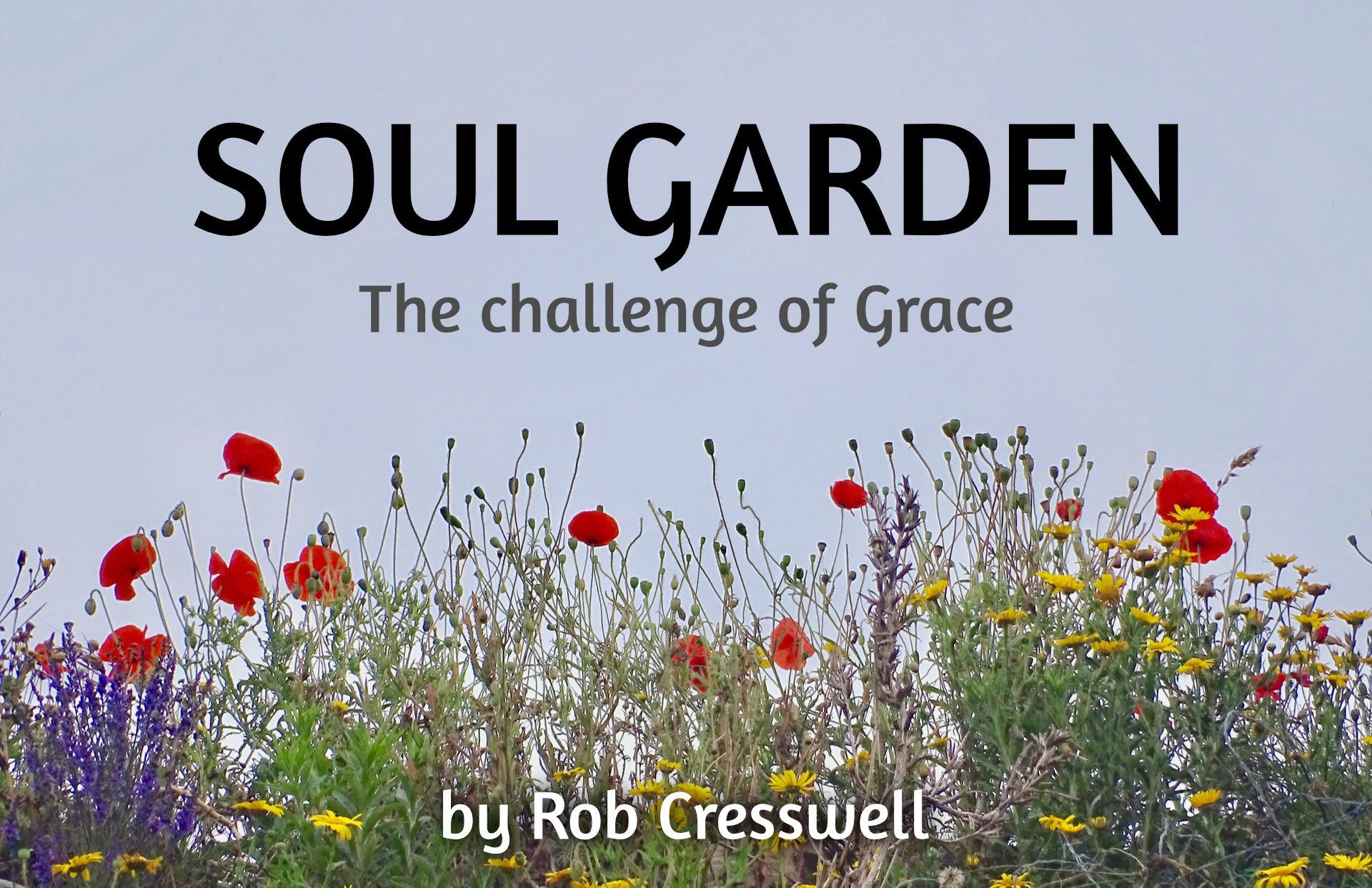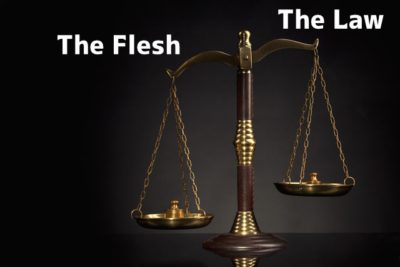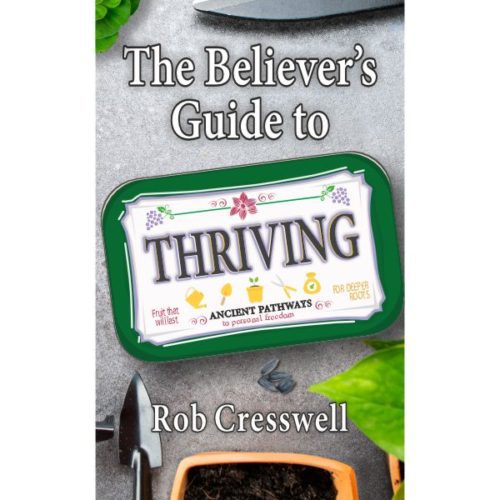
SOUL GARDEN: THE CHALLENGE OF GRACE
By Rob Cresswell
SOUL GARDEN: THE CHALLENGE OF GRACE
By Rob Cresswell
Here’s the basic faith-leap of Christianity: The corner-stone of the Gospel is that we’re saved by the grace of God and not by our own efforts or righteousness. This is made possible by the atoning sacrifice of Jesus, the lamb of God who takes away the sin of the world (John 1:29). As Jesus himself explained to Nicodemus:
“Just as Moses lifted up the snake in the wilderness, so the Son of Man must be lifted up, that everyone who believes may have eternal life in him.” John 3:14
The eternal salvation of our soul is offered freely by the sacrifice of Jesus and received through faith. Take a moment to receive that truth and revel in the wonder of it… Now this changes everything. Once we have placed our faith in Jesus as our Saviour, we are set free. Now we don’t measure our righteousness by the good works we do; now we consider ourselves righteous (acceptable to God) by the righteousness of Jesus. This is not simply the ‘good news’ of the gospel but the extremely amazing news because Jesus is wholly righteous, and by faith in him, so are we.
“God made him who had no sin to be sin for us, so that in him we might become the righteousness of God.” 2 Corinthians 5:21
This outrageous message of the gospel teaches us that now we are empowered to do good because Jesus has made us righteous. Our motivation for doing good now comes out of a supernaturally transformed heart. It’s an inside job! This is a massive paradigm shift for our outlook on life. We used to think we did good deeds (give to the poor, help the needy, etc.) to become more righteous (get in God’s good books). But now we do them because we’re already in God’s good books! This is what sets Christianity apart from all other religions or ‘ways of life’. We may all have ‘doing good’ in common, but we are motivated to do so for entirely different reasons. Essentially, it’s what makes Christianity a ‘faith’ (and uniquely a faith in a person), rather than a religion or a ‘way of life’. It’s not what we do, it’s why we do it.
So, this surely begs the question, doesn’t it? When it comes to the Christian faith what place is there for effort, or work, or sacrifice? Since Jesus has done it all anyway. Is there any at all? What if I don’t feel like praying or serving the Lord today? What difference does it make to my salvation? Is there any value in making myself do these things? Because, and here’s the dilemma, once I do things, not out of love and gratitude to Jesus, but rather, ‘because I think I ought to do them’ then surely I’m back to that ‘trying to be good by my own (dead) works’ (Hebrews 6:1) again; and there’s no longer any real value in doing that… is there?

A GUARD AGAINST WEAKNESS
Now everything in us should think, “hang on, no, that’s not right, we can’t live our lives by how we feel, that’s a shallow and selfish way to live; it’s unspiritual.” But sadly, this is exactly the sort of mind set many Christians end up with. It’s what Dietrich Bonhoeffer referred to as ‘cheap grace’:
“The essence of grace, we suppose, is that the account has been paid in advance; and, because it has been paid, everything can be had for nothing… Cheap grace is grace without discipleship, grace without the cross, grace without Jesus Christ, living and incarnate.”
‘The Cost of Discipleship’ Bonhoeffer
If we conclude that this gospel of grace leaves no room for sacrifice or self-discipline then the real problem is with our thinking, not with the gospel. But watch out! Don’t start making a list of duties just yet. There were those in the early church who were determined to impose external rules and regulations on new believers, but the Apostle Paul condemns them too. He says they are trying to rob the cross of its power. He explains that outward acts of religion now count for nothing in the light of God’s grace. What counts is inner spiritual transformation of the heart and mind:
“Such restrictions indeed have an appearance of wisdom, with their self-prescribed worship, their false humility, and their harsh treatment of the body; but they are of no value against the indulgence of the flesh.” Colossians 2:23
The Apostle Paul not only had to address those who wanted to impose a ‘do whatever you like immorality’ on new Christians, he also had to correct those who swung the other way with lists of harsh rules, disciplines and regulations. So, which is it to be? Self-discipline or no self-discipline? The answer is in the balance that makes a third way; a narrow way.
THE NARROW WAY
The ancient paths of Christian devotion are the narrow way between empty works and immoral licence or between self-righteousness and self-serving laziness. They hold in balance sacrifice and grace, obedience and devotion, obligation and whole-hearted consent.
There is a spiritual battle going on after all. There are forces in our lives that seek to rob us of the freedom of the gospel, not least: the world, the flesh and the devil (Ephesians 2:2-3). The real value of the disciplines is that they help to strengthen our faith in this fight and help us ‘work out our salvation’ (Philippians 2:12). Through faith in the Gospel of Grace we can walk in meaningful self-discipline and a real passion for the things of the Spirit.
“This is what the LORD says: ‘Stand at the crossroads and look; ask for the ancient paths, ask where the good way is, and walk in it, and you will find rest for your souls.’” Jeremiah 6:16
The ‘ancient pathway’ is the low road to the highway that saints have walked before us and beckon all those who seek the deeper life to follow. We are, after all, called to be disciples and the word ‘disciple’ comes from the same root as the word ‘discipline’. The reason we practice self-control, (which is a fruit of the Holy Spirit – Galatians 5:23), is because we have submitted control of our lives to Jesus. The determination to practice spiritual devotions on a regular basis guards against the danger of our human weaknesses (only pursing the things of God when it suits me, or using Gods grace as an excuse to be self-centred). They can prevent us from being shallow or fickle in our faith, and they can and will help us cultivate a passion for God by transforming our thinking and helping us mature spiritually.
GETTING OFF THE SCALES
The Apostle Paul often uses the terms of slavery or imprisonment to convey spiritual truths about our salvation. In his letter to the young church in Rome he names two particular slave drivers as ‘the law’ and ‘the flesh’.
“So then, I myself in my mind am a slave to God’s law, but in my sinful nature (or the flesh) a slave to the law of sin.” Romans 7:25
He summarises our pre-salvation dilemma like this: ‘The law punishes me when I’m bad and the flesh punishes me when I’m good. So, I can’t win.’ The problem is that these two task masters inevitably create a ‘scales-of-balance’ mentality that shackles my thinking.

Imagine an old-fashioned pair of kitchen scales with a tin plate on each side and a pivot in the middle. If I’m selfish and overindulge my flesh, in my thinking the scales tip one way. Now I’m in debt to my heavenly bank account, ‘I’m in the red’ so to speak. Now I feel guilty and need to make restoration so I feel compelled to address the balance. So, let’s see, I’ll do a few random acts of kindness, maybe give to charity and go to a church prayer meeting… and there! We’re good with God again! And mistakenly, in my thinking, I’m all set for a bit more self-indulgence.
That’s how most people in the world live. And sadly, it’s how many Christians live too… the tragedy is that in reality (according to the gospel), Jesus has set us free from that kind of lifestyle. However, many of us still settle for thinking and living that way. It’s a worldly mind-set that we have to allow the Holy Spirit to break off us and replace with a mind set of divine love (Romans 12).
PRISON BREAK
Have you ever seen the movie, The Shawshank Redemption? It’s a pretty gritty movie (and not for everyone), but it’s one of the most popular movies ever made (impressively remaining at the very top of the IMDB 100). It’s about the long-term imprisonment of an innocent man called Andy Dufresne in Portland Main, Shawshank State Penitentiary. It’s a tale of endurance and patience, but it’s also about how long-term prisoners can become institutionalised in the prison system.
Those ‘lifers’ who entered the prison as young men may leave as old men. Prison life is all they know; and often they’re simply not equipped for life on the outside. They can’t cope with their ‘freedom’ and they’re lost and vulnerable without rules and regulations. The tragedy is that those who are released often reoffend ‘on the outside’ so they can go back to the prison life they know.
This is a picture of what happens to so many of us when Jesus sets us free from the prison of the law and the flesh. Despite our hatred of the prison and all it stands for we’re deeply institutionalised; we don’t know how else to think. So, we’re often tempted to sabotage our ‘freedom in Christ’ and go back to that ‘scales of balance’ mentality. Even our church life can reinforce this behaviour as we fall into habitual sins through the week and get saved again every Sunday. Jesus died to get us off this roundabout on a journey of freedom to a transformed mind and a spiritual maturity.
FIVE SECRET DEVOTIONS
This is where the spiritual disciplines can have an important role to play. A personal commitment to observe regular disciplined observances, such as fasting or giving, can help position us to receive the renewing work of the Holy Spirit in our minds. Remember that though we may invest the time and effort, it’s the Holy Spirit who’s doing the real work of inner transformation. What the disciplines do is help re-orientate us in our attitudes and thinking to receive his inner work. This is what Jesus meant by having ‘eyes that are good’ (Matthew 6:22) and what Paul meant by being ‘transformed by the renewing of your mind’ (Romans 12:2).
-
 ‘The Believer’s Guide to Thriving’ invites you to walk the ancient pathways by cultivating the five personal devotions of charity, prayer, fasting, worship and meditation. Through simple guidance and practical application learn how to weave these classic Christian disciplines into your lifestyle, establish deep roots that will yield maturity and fruit that will last.
‘The Believer’s Guide to Thriving’ invites you to walk the ancient pathways by cultivating the five personal devotions of charity, prayer, fasting, worship and meditation. Through simple guidance and practical application learn how to weave these classic Christian disciplines into your lifestyle, establish deep roots that will yield maturity and fruit that will last.
Here’s the basic faith-leap of Christianity: The corner-stone of the Gospel is that we’re saved by the grace of God and not by our own efforts or righteousness. This is made possible by the atoning sacrifice of Jesus, the lamb of God who takes away the sin of the world (John 1:29). As Jesus himself explained to Nicodemus:
“Just as Moses lifted up the snake in the wilderness, so the Son of Man must be lifted up, that everyone who believes may have eternal life in him.” John 3:14
The eternal salvation of our soul is offered freely by the sacrifice of Jesus and received through faith. Take a moment to receive that truth and revel in the wonder of it… Now this changes everything. Once we have placed our faith in Jesus as our Saviour, we are set free. Now we don’t measure our righteousness by the good works we do; now we consider ourselves righteous (acceptable to God) by the righteousness of Jesus. This is not simply the ‘good news’ of the gospel but the extremely amazing news because Jesus is wholly righteous, and by faith in him, so are we.
“God made him who had no sin to be sin for us, so that in him we might become the righteousness of God.” 2 Corinthians 5:21
This outrageous message of the gospel teaches us that now we are empowered to do good because Jesus has made us righteous. Our motivation for doing good now comes out of a supernaturally transformed heart. It’s an inside job! This is a massive paradigm shift for our outlook on life. We used to think we did good deeds (give to the poor, help the needy, etc.) to become more righteous (get in God’s good books). But now we do them because we’re already in God’s good books! This is what sets Christianity apart from all other religions or ‘ways of life’. We may all have ‘doing good’ in common, but we are motivated to do so for entirely different reasons. Essentially, it’s what makes Christianity a ‘faith’ (and uniquely a faith in a person), rather than a religion or a ‘way of life’. It’s not what we do, it’s why we do it.
So, this surely begs the question, doesn’t it? When it comes to the Christian faith what place is there for effort, or work, or sacrifice? Since Jesus has done it all anyway. Is there any at all? What if I don’t feel like praying or serving the Lord today? What difference does it make to my salvation? Is there any value in making myself do these things? Because, and here’s the dilemma, once I do things, not out of love and gratitude to Jesus, but rather, ‘because I think I ought to do them’ then surely I’m back to that ‘trying to be good by my own (dead) works’ (Hebrews 6:1) again; and there’s no longer any real value in doing that… is there?

A GUARD AGAINST WEAKNESS
Now everything in us should think, “hang on, no, that’s not right, we can’t live our lives by how we feel, that’s a shallow and selfish way to live; it’s unspiritual.” But sadly, this is exactly the sort of mind set many Christians end up with. It’s what Dietrich Bonhoeffer referred to as ‘cheap grace’:
“The essence of grace, we suppose, is that the account has been paid in advance; and, because it has been paid, everything can be had for nothing… Cheap grace is grace without discipleship, grace without the cross, grace without Jesus Christ, living and incarnate.”
‘The Cost of Discipleship’ Bonhoeffer
If we conclude that this gospel of grace leaves no room for sacrifice or self-discipline then the real problem is with our thinking, not with the gospel. But watch out! Don’t start making a list of duties just yet. There were those in the early church who were determined to impose external rules and regulations on new believers, but the Apostle Paul condemns them too. He says they are trying to rob the cross of its power. He explains that outward acts of religion now count for nothing in the light of God’s grace. What counts is inner spiritual transformation of the heart and mind:
“Such restrictions indeed have an appearance of wisdom, with their self-prescribed worship, their false humility, and their harsh treatment of the body; but they are of no value against the indulgence of the flesh.” Colossians 2:23
The Apostle Paul not only had to address those who wanted to impose a ‘do whatever you like immorality’ on new Christians, he also had to correct those who swung the other way with lists of harsh rules, disciplines and regulations. So, which is it to be? Self-discipline or no self-discipline? The answer is in the balance that makes a third way; a narrow way.
THE NARROW WAY
The ancient paths of Christian devotion are the narrow way between empty works and immoral licence or between self-righteousness and self-serving laziness. They hold in balance sacrifice and grace, obedience and devotion, obligation and whole-hearted consent.
There is a spiritual battle going on after all. There are forces in our lives that seek to rob us of the freedom of the gospel, not least: the world, the flesh and the devil (Ephesians 2:2-3). The real value of the disciplines is that they help to strengthen our faith in this fight and help us ‘work out our salvation’ (Philippians 2:12). Through faith in the Gospel of Grace we can walk in meaningful self-discipline and a real passion for the things of the Spirit.
“This is what the LORD says: ‘Stand at the crossroads and look; ask for the ancient paths, ask where the good way is, and walk in it, and you will find rest for your souls.’” Jeremiah 6:16
The ‘ancient pathway’ is the low road to the highway that saints have walked before us and beckon all those who seek the deeper life to follow. We are, after all, called to be disciples and the word ‘disciple’ comes from the same root as the word ‘discipline’. The reason we practice self-control, (which is a fruit of the Holy Spirit – Galatians 5:23), is because we have submitted control of our lives to Jesus. The determination to practice spiritual devotions on a regular basis guards against the danger of our human weaknesses (only pursing the things of God when it suits me, or using Gods grace as an excuse to be self-centred). They can prevent us from being shallow or fickle in our faith, and they can and will help us cultivate a passion for God by transforming our thinking and helping us mature spiritually.
GETTING OFF THE SCALES
The Apostle Paul often uses the terms of slavery or imprisonment to convey spiritual truths about our salvation. In his letter to the young church in Rome he names two particular slave drivers as ‘the law’ and ‘the flesh’.
“So then, I myself in my mind am a slave to God’s law, but in my sinful nature (or the flesh) a slave to the law of sin.” Romans 7:25
He summarises our pre-salvation dilemma like this: ‘The law punishes me when I’m bad and the flesh punishes me when I’m good. So, I can’t win.’ The problem is that these two task masters inevitably create a ‘scales-of-balance’ mentality that shackles my thinking.

Imagine an old-fashioned pair of kitchen scales with a tin plate on each side and a pivot in the middle. If I’m selfish and overindulge my flesh, in my thinking the scales tip one way. Now I’m in debt to my heavenly bank account, ‘I’m in the red’ so to speak. Now I feel guilty and need to make restoration so I feel compelled to address the balance. So, let’s see, I’ll do a few random acts of kindness, maybe give to charity and go to a church prayer meeting… and there! We’re good with God again! And mistakenly, in my thinking, I’m all set for a bit more self-indulgence.
That’s how most people in the world live. And sadly, it’s how many Christians live too… the tragedy is that in reality (according to the gospel), Jesus has set us free from that kind of lifestyle. However, many of us still settle for thinking and living that way. It’s a worldly mind-set that we have to allow the Holy Spirit to break off us and replace with a mind set of divine love (Romans 12).
PRISON BREAK
Have you ever seen the movie, The Shawshank Redemption? It’s a pretty gritty movie (and not for everyone), but it’s one of the most popular movies ever made (impressively remaining at the very top of the IMDB 100). It’s about the long-term imprisonment of an innocent man called Andy Dufresne in Portland Main, Shawshank State Penitentiary. It’s a tale of endurance and patience, but it’s also about how long-term prisoners can become institutionalised in the prison system.
Those ‘lifers’ who entered the prison as young men may leave as old men. Prison life is all they know; and often they’re simply not equipped for life on the outside. They can’t cope with their ‘freedom’ and they’re lost and vulnerable without rules and regulations. The tragedy is that those who are released often reoffend ‘on the outside’ so they can go back to the prison life they know.
This is a picture of what happens to so many of us when Jesus sets us free from the prison of the law and the flesh. Despite our hatred of the prison and all it stands for we’re deeply institutionalised; we don’t know how else to think. So, we’re often tempted to sabotage our ‘freedom in Christ’ and go back to that ‘scales of balance’ mentality. Even our church life can reinforce this behaviour as we fall into habitual sins through the week and get saved again every Sunday. Jesus died to get us off this roundabout on a journey of freedom to a transformed mind and a spiritual maturity.
FIVE SECRET DEVOTIONS
This is where the spiritual disciplines can have an important role to play. A personal commitment to observe regular disciplined observances, such as fasting or giving, can help position us to receive the renewing work of the Holy Spirit in our minds. Remember that though we may invest the time and effort, it’s the Holy Spirit who’s doing the real work of inner transformation. What the disciplines do is help re-orientate us in our attitudes and thinking to receive his inner work. This is what Jesus meant by having ‘eyes that are good’ (Matthew 6:22) and what Paul meant by being ‘transformed by the renewing of your mind’ (Romans 12:2).
-
 ‘The Believer’s Guide to Thriving’ invites you to walk the ancient pathways by cultivating the five personal devotions of charity, prayer, fasting, worship and meditation. Through simple guidance and practical application learn how to weave these classic Christian disciplines into your lifestyle, establish deep roots that will yield maturity and fruit that will last.
‘The Believer’s Guide to Thriving’ invites you to walk the ancient pathways by cultivating the five personal devotions of charity, prayer, fasting, worship and meditation. Through simple guidance and practical application learn how to weave these classic Christian disciplines into your lifestyle, establish deep roots that will yield maturity and fruit that will last.
Here’s the basic faith-leap of Christianity: The corner-stone of the Gospel is that we’re saved by the grace of God and not by our own efforts or righteousness. This is made possible by the atoning sacrifice of Jesus, the lamb of God who takes away the sin of the world (John 1:29). As Jesus himself explained to Nicodemus:
“Just as Moses lifted up the snake in the wilderness, so the Son of Man must be lifted up, that everyone who believes may have eternal life in him.” John 3:14
The eternal salvation of our soul is offered freely by the sacrifice of Jesus and received through faith. Take a moment to receive that truth and revel in the wonder of it… Now this changes everything. Once we have placed our faith in Jesus as our Saviour, we are set free. Now we don’t measure our righteousness by the good works we do; now we consider ourselves righteous (acceptable to God) by the righteousness of Jesus. This is not simply the ‘good news’ of the gospel but the extremely amazing news because Jesus is wholly righteous, and by faith in him, so are we.
“God made him who had no sin to be sin for us, so that in him we might become the righteousness of God.” 2 Corinthians 5:21
This outrageous message of the gospel teaches us that now we are empowered to do good because Jesus has made us righteous. Our motivation for doing good now comes out of a supernaturally transformed heart. It’s an inside job! This is a massive paradigm shift for our outlook on life. We used to think we did good deeds (give to the poor, help the needy, etc.) to become more righteous (get in God’s good books). But now we do them because we’re already in God’s good books! This is what sets Christianity apart from all other religions or ‘ways of life’. We may all have ‘doing good’ in common, but we are motivated to do so for entirely different reasons. Essentially, it’s what makes Christianity a ‘faith’ (and uniquely a faith in a person), rather than a religion or a ‘way of life’. It’s not what we do, it’s why we do it.
So, this surely begs the question, doesn’t it? When it comes to the Christian faith what place is there for effort, or work, or sacrifice? Since Jesus has done it all anyway. Is there any at all? What if I don’t feel like praying or serving the Lord today? What difference does it make to my salvation? Is there any value in making myself do these things? Because, and here’s the dilemma, once I do things, not out of love and gratitude to Jesus, but rather, ‘because I think I ought to do them’ then surely I’m back to that ‘trying to be good by my own (dead) works’ (Hebrews 6:1) again; and there’s no longer any real value in doing that… is there?

A GUARD AGAINST WEAKNESS
Now everything in us should think, “hang on, no, that’s not right, we can’t live our lives by how we feel, that’s a shallow and selfish way to live; it’s unspiritual.” But sadly, this is exactly the sort of mind set many Christians end up with. It’s what Dietrich Bonhoeffer referred to as ‘cheap grace’:
“The essence of grace, we suppose, is that the account has been paid in advance; and, because it has been paid, everything can be had for nothing… Cheap grace is grace without discipleship, grace without the cross, grace without Jesus Christ, living and incarnate.”
‘The Cost of Discipleship’ Bonhoeffer
If we conclude that this gospel of grace leaves no room for sacrifice or self-discipline then the real problem is with our thinking, not with the gospel. But watch out! Don’t start making a list of duties just yet. There were those in the early church who were determined to impose external rules and regulations on new believers, but the Apostle Paul condemns them too. He says they are trying to rob the cross of its power. He explains that outward acts of religion now count for nothing in the light of God’s grace. What counts is inner spiritual transformation of the heart and mind:
“Such restrictions indeed have an appearance of wisdom, with their self-prescribed worship, their false humility, and their harsh treatment of the body; but they are of no value against the indulgence of the flesh.” Colossians 2:23
The Apostle Paul not only had to address those who wanted to impose a ‘do whatever you like immorality’ on new Christians, he also had to correct those who swung the other way with lists of harsh rules, disciplines and regulations. So, which is it to be? Self-discipline or no self-discipline? The answer is in the balance that makes a third way; a narrow way.
THE NARROW WAY
The ancient paths of Christian devotion are the narrow way between empty works and immoral licence or between self-righteousness and self-serving laziness. They hold in balance sacrifice and grace, obedience and devotion, obligation and whole-hearted consent.
There is a spiritual battle going on after all. There are forces in our lives that seek to rob us of the freedom of the gospel, not least: the world, the flesh and the devil (Ephesians 2:2-3). The real value of the disciplines is that they help to strengthen our faith in this fight and help us ‘work out our salvation’ (Philippians 2:12). Through faith in the Gospel of Grace we can walk in meaningful self-discipline and a real passion for the things of the Spirit.
“This is what the LORD says: ‘Stand at the crossroads and look; ask for the ancient paths, ask where the good way is, and walk in it, and you will find rest for your souls.’” Jeremiah 6:16
The ‘ancient pathway’ is the low road to the highway that saints have walked before us and beckon all those who seek the deeper life to follow. We are, after all, called to be disciples and the word ‘disciple’ comes from the same root as the word ‘discipline’. The reason we practice self-control, (which is a fruit of the Holy Spirit – Galatians 5:23), is because we have submitted control of our lives to Jesus. The determination to practice spiritual devotions on a regular basis guards against the danger of our human weaknesses (only pursing the things of God when it suits me, or using Gods grace as an excuse to be self-centred). They can prevent us from being shallow or fickle in our faith, and they can and will help us cultivate a passion for God by transforming our thinking and helping us mature spiritually.
GETTING OFF THE SCALES
The Apostle Paul often uses the terms of slavery or imprisonment to convey spiritual truths about our salvation. In his letter to the young church in Rome he names two particular slave drivers as ‘the law’ and ‘the flesh’.
“So then, I myself in my mind am a slave to God’s law, but in my sinful nature (or the flesh) a slave to the law of sin.” Romans 7:25
He summarises our pre-salvation dilemma like this: ‘The law punishes me when I’m bad and the flesh punishes me when I’m good. So, I can’t win.’ The problem is that these two task masters inevitably create a ‘scales-of-balance’ mentality that shackles my thinking.

Imagine an old-fashioned pair of kitchen scales with a tin plate on each side and a pivot in the middle. If I’m selfish and overindulge my flesh, in my thinking the scales tip one way. Now I’m in debt to my heavenly bank account, ‘I’m in the red’ so to speak. Now I feel guilty and need to make restoration so I feel compelled to address the balance. So, let’s see, I’ll do a few random acts of kindness, maybe give to charity and go to a church prayer meeting… and there! We’re good with God again! And mistakenly, in my thinking, I’m all set for a bit more self-indulgence.
That’s how most people in the world live. And sadly, it’s how many Christians live too… the tragedy is that in reality (according to the gospel), Jesus has set us free from that kind of lifestyle. However, many of us still settle for thinking and living that way. It’s a worldly mind-set that we have to allow the Holy Spirit to break off us and replace with a mind set of divine love (Romans 12).
PRISON BREAK
Have you ever seen the movie, The Shawshank Redemption? It’s a pretty gritty movie (and not for everyone), but it’s one of the most popular movies ever made (impressively remaining at the very top of the IMDB 100). It’s about the long-term imprisonment of an innocent man called Andy Dufresne in Portland Main, Shawshank State Penitentiary. It’s a tale of endurance and patience, but it’s also about how long-term prisoners can become institutionalised in the prison system.
Those ‘lifers’ who entered the prison as young men may leave as old men. Prison life is all they know; and often they’re simply not equipped for life on the outside. They can’t cope with their ‘freedom’ and they’re lost and vulnerable without rules and regulations. The tragedy is that those who are released often reoffend ‘on the outside’ so they can go back to the prison life they know.
This is a picture of what happens to so many of us when Jesus sets us free from the prison of the law and the flesh. Despite our hatred of the prison and all it stands for we’re deeply institutionalised; we don’t know how else to think. So, we’re often tempted to sabotage our ‘freedom in Christ’ and go back to that ‘scales of balance’ mentality. Even our church life can reinforce this behaviour as we fall into habitual sins through the week and get saved again every Sunday. Jesus died to get us off this roundabout on a journey of freedom to a transformed mind and a spiritual maturity.
FIVE SECRET DEVOTIONS
This is where the spiritual disciplines can have an important role to play. A personal commitment to observe regular disciplined observances, such as fasting or giving, can help position us to receive the renewing work of the Holy Spirit in our minds. Remember that though we may invest the time and effort, it’s the Holy Spirit who’s doing the real work of inner transformation. What the disciplines do is help re-orientate us in our attitudes and thinking to receive his inner work. This is what Jesus meant by having ‘eyes that are good’ (Matthew 6:22) and what Paul meant by being ‘transformed by the renewing of your mind’ (Romans 12:2).
-
 ‘The Believer’s Guide to Thriving’ invites you to walk the ancient pathways by cultivating the five personal devotions of charity, prayer, fasting, worship and meditation. Through simple guidance and practical application learn how to weave these classic Christian disciplines into your lifestyle, establish deep roots that will yield maturity and fruit that will last.
‘The Believer’s Guide to Thriving’ invites you to walk the ancient pathways by cultivating the five personal devotions of charity, prayer, fasting, worship and meditation. Through simple guidance and practical application learn how to weave these classic Christian disciplines into your lifestyle, establish deep roots that will yield maturity and fruit that will last.







